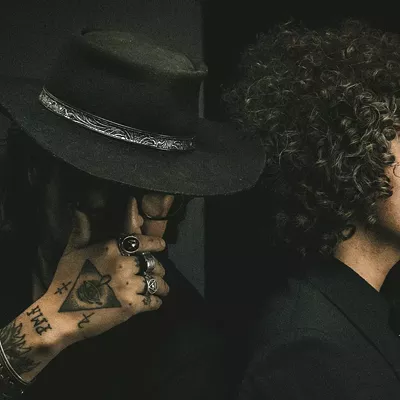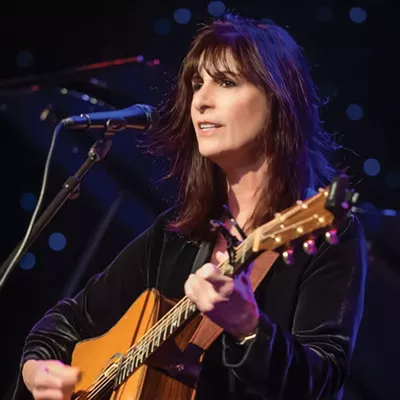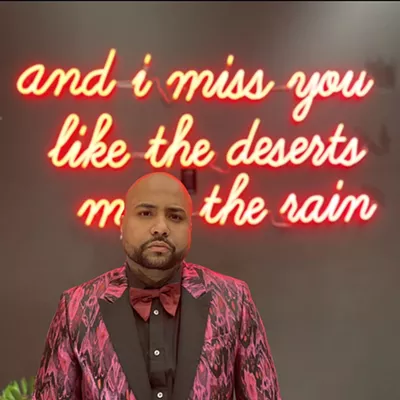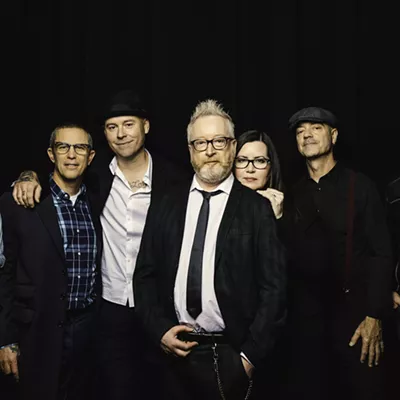For decades, Tucson musicians, aspiring and otherwise, have frequented the Chicago Music Store. Its longstanding storefront on Sixth Avenue and Congress Street has been a beacon of consistency in downtown Tucson during an era of development. In February, the store downsized to a space less than one block away, and although the physical shop is decidedly different from the original, the ethos behind it is the same.
The Chicago Music Store is a family-run business, and it has been since it opened in 1919. Mark Levkowitz, the current owner, is the grandson of the shop's founders. His grandparents, like so many Midwesterners, moved to Tucson for health reasons.
"Back then people used to name their shops after the cities they were from," Levkowitz says. "My family's from Chicago, so we're The Chicago Store."
Music wasn't the shop's focus, initially. It started as a dry goods store, selling everything from jewelry to firearms to clothing to camping gear.
"I was rummaging around in the basement a few years ago, and I found an old pair of Wrangler jeans that went for 600 bucks on eBay," Levkowitz says.
The Chicago Store served the needs of a growing Tucson community, and it wasn't until Levkowitz's uncle joined the Tucson High band that they started carrying musical instruments. There weren't any music shops in Tucson at the time, so parents of kids in the band started asking The Chicago Store to carry instruments.
"Back then, we were the only gig in town," Levkowitz says.
Being the first in the game gave The Chicago Store an edge, no doubt, but their continued success can be credited, largely, to their people-first approach to business.
"My dad and uncle were always very willing to help struggling musicians out," Levkowitz says. "Either with donations, or by allowing them to make a small down payment and pay off the rest, or no down payment at all and just monthly payments."
This altruism is a trait Levkowitz inherited from the family's previous generations. One of his regular customers, a DJ named Lion Elroy Pereira, will always be a customer of the Chicago Store because of this.
When Pereira was passing through Tucson thirteen years ago on tour, his partner took off with the van and all of his belongings the day of his show. Pereira decided that the show—at Sharks, then just east of the Chicago Store's old location—had to go on. He went into the Chicago Store on a whim, and, moved by his story, Levkowitz leant him $5,000 worth of equipment for the gig.
Pereira has stayed in Tucson, growing his own production company, Brimstone Recording Studios. Handing over expensive equipment to a total stranger is a huge risk, but for the Chicago Store it carried with it a substantial reward. Pereira has been a loyal customer for the last thirteen years, and he says that whenever his musician friends come through town, he always sends them to Chicago Music Store.
One might think this willingness to help musicians would extend from having been a musician, but no. Though many in the Levkowitz family dabbled over the years, none ever chose to pursue music in a serious way.
"I think it was a combination of compassion, a desire to do business and faith in people" Levkowitz says. "Today, you don't really do business on a hand shake too often."
Levkowitz says many successful local musicians have told him that, were it not for his father's generosity and trust, they never would have gotten their start. In addition to working with adult artists, the family has maintained its connection to budding musicians by donating instruments to high school bands. Levkowitz also says the store has seen its fair share of famous actors and musicians since he's been behind the counter.
"When I was a lot younger I used to be a big fan of 90210," says Levkowitz. "One of the actresses from the show, Jenny Garth, was in town filming a movie with Johnny Depp. They came in together with Winona Ryder. That was cool."
Levkowitz remembers selling guitars to Johnny Cash and Sheryl Crow, too.
"One of my favorite stories is Billy Gibbons, before he got sober, used to come in, and I'd follow him around with a notepad while he'd walk through the store and say 'send me that, send me that, send me that and send me the bill.' We'd send it all to Houston, and he'd send us a check," says Levkowitz.
Though the Chicago Music Store's role in the community hasn't changed significantly, the world they operate in has, and Levkowitz has been tasked with navigating it.
"In the '60s it was all about rock 'n' roll," he says. "Every kid wanted to play an instrument. Trends change over time, and it's quite a bit different now than it used to be. That's why we don't need that huge location. We used to sell huge sound systems, now everything's compacted."
Online sales have also had an impact, though not a catastrophic one. "Fortunately a lot of people want to feel and hear an instrument before they buy it, which has been a savior for our business." says Levkowitz.
Along with the store's tactile advantage, Chicago Music Store has also changed pricing to match Amazon, so when customers compare prices they aren't enticed by competitors. In addition to pricing competitively, the store offers two free lessons with every instrument purchase or rental, something online retailers aren't able to do. Though the new downtown location doesn't have a space for lessons, the store's eastside location, which opened about three years ago at Speedway Boulevard and Craycroft Road, does have lesson studios.
It's not hard to see why he chose to stay in the business. Embracing change is an inevitability of any successful multi-generational business, and Levkowitz seems to have fully embraced the letting go of his family's old space.
"We'd been thinking that the old space was way too big for us. It was pretty dilapidated," Levkowitz says. "New buyers came in and made us an offer we couldn't refuse. We were ready to move. I thought it was going to be really traumatic, but it's not. We're in a great space. People come in and they say, 'it's a lot smaller!' But we don't like to use the 's' word—it's more intimate."
Levkowitz is behind the counter at the new, more intimate downtown setting, at 45 S. Sixth Ave, about half of the week. When he's not downtown, he can usually be found on the eastside location at 4646 E. Speedway Blvd.







